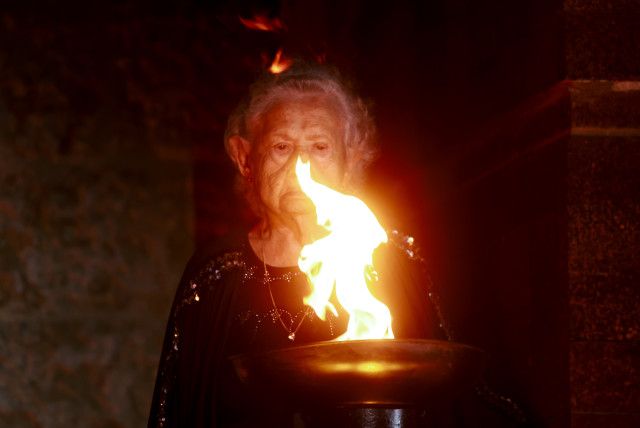Arye Deri pitches 50% off graves to impoverished Holocaust survivors

A third of Holocaust survivors in Israel live under the poverty line, according to the Foundation for the Welfare of Holocaust Victims.
Shas chairman Arye Deri lauded a bill proposed by a member of his party that would give Holocaust survivors a 50% discount on graves, tweeting on Tuesday that “it’s the least we can give to the survivors who are still alive.” The tweet has since been deleted and an edited version has been re-uploaded.
“On Holocaust Remembrance Day, Shas takes care of the honor and welfare of Holocaust survivors!” tweeted Deri. “Shas placed a bill on the Knesset table that would grant a significant discount to Holocaust survivors for the purchase of a cemetery plot. This is the least we can give to the survivors who are still alive. I wish to thank the initiator of the bill, MK Erez Malul, for this important initiative for the welfare of Holocaust survivors.”
The tweet sparked ridicule and outrage on social media, with Twitter users calling the tweet “bizarre” and “ridiculous,” and pointing to the issue of widespread poverty among Holocaust survivors as something that desperately needs attention. Deri later deleted his tweet and replaced it with one simply thanking Malul for advancing the bill and stating that the bill “indicates a high social sensitivity.”
A third of Holocaust survivors live under the poverty line
A recent survey by the Foundation for the Welfare of Holocaust Victims revealed that 22% of the supported survivors had to give up products and services they needed, including clothing, medical tests, absorbent products, electrical appliances, home maintenance and other services. A third of Holocaust survivors in Israel live under the poverty line, according to the foundation.
The government did not include a single clause for the benefit of the Holocaust survivors as part of the currently proposed national budget, which was approved by the government and in a first reading in the Knesset. The budget of the Holocaust Survivors’ Rights Authority, which is under the responsibility of the Prime Minister’s Office, has not been updated either. The budget, which stands at NIS 5 billion, was hit by the increase in inflation, so that in practice the budget suffered a hit of several tens of millions of shekels.
In Israel, the cost of burial is fully covered by the National Insurance Institute (Bituah Leumi), meaning that it is (theoretically) free for every individual who dies in Israel, including non-citizens. The National Insurance Institute does, however, only cover the minimum cost grave in the city where the person died (i.e. if they died in a not densely populated place they will likely be able to be buried in a standard grave, while those who die in crowded cities will likely only be able to get a randomized plot in a multi-floor vault).
Individuals who want to be buried in a certain spot or certain type of grave can reserve plots, for a price.
The explanation for the new Shas proposal states that a quarter of the Holocaust survivors live below the poverty line “with over 80% of them forced to give up essential products and services due to financial difficulties.”
It is also written that “a discount on the grave plot will be a significant aid to their ability to be buried in the place of their choice.” Malul also added that there is symbolic importance “in the State of Israel’s recognition of the contribution of the Holocaust survivors to the rise of Israel.”
Jerusalem Post Store
`; document.getElementById("linkPremium").innerHTML = cont; var divWithLink = document.getElementById("premium-link"); if (divWithLink !== null && divWithLink !== 'undefined') { divWithLink.style.border = "solid 1px #cb0f3e"; divWithLink.style.textAlign = "center"; divWithLink.style.marginBottom = "15px"; divWithLink.style.marginTop = "15px"; divWithLink.style.width = "100%"; divWithLink.style.backgroundColor = "#122952"; divWithLink.style.color = "#ffffff"; divWithLink.style.lineHeight = "1.5"; } } (function (v, i) { });

